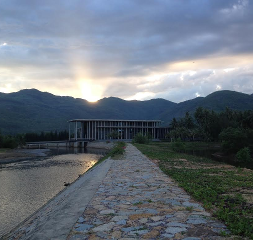Speaker
Description
GERDA is a low background experiment aimed for the serach of neutrinoless double beta ($0 \nu\beta\beta $) decay. The observation of such a process would demostrate the presence of a Majorana term in the neutrino mass and prove that lepton number is not conserved. The experimental setup is located at the LNGS underground laboratory of INFN in Italy. The search is performed with high purity germanium detectors operated in liquid argon (LAr). The detectors are enriched in $ ^{76} $Ge to 86%. GERDA Phase I was successfully completed with the best background level in the field (if normalized to region of interest) of 10$ ^{−2} $ counts/(keV•kg•yr). Accumulated statistics allows to derive the most stringent lower limit on the half-life for the $0 \nu\beta\beta $ of $ ^{76} $Ge: T $ ^{0\nu} _{1/2} $ > 2.1•10 $ ^{25} $ yr at 90 % C.L. Phase II of the experiment with 30 newly produced Broad Energy Germanium (BEGe) detectors plans to reach an exposure of about 100 kg•yr. BEGe detectors have better resolution and powerful pulse shape discrimination capability which helps to suppress background events. Phase II is equipped with a LAr scintillation veto for further reduction of the background level. The goal of Phase II is to reach a sensitivity for the $0 \nu\beta\beta $ decay half-life of T $ ^{0\nu} _{1/2} $ > 10 $ ^{26} $ at 90 % C.L. The installation of Phase II was completed and all detectors were deployed in December 2015. The status of GERDA Phase II experiment will be presented.
